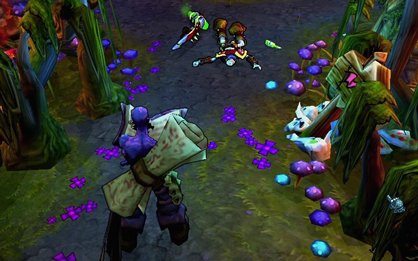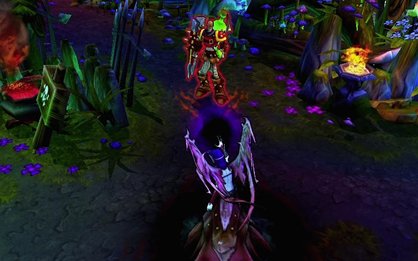League of Legends: Clash of Fates – hands-on
A professional take on Defense of the Ancients, by the original creator
If you don’t know what Defense of the Ancients is (lovingly known as DotA by its gigantic community), you may not know what an RTS is, either. The original DotA is a single custom map that was created for WarCraft III. It took the core concept of the third WarCraft’s focus on hero units and stripped away the bothersome base-building and army management. It then introduced, through various updates, so many heroes and items that the once humble map clearly had evolved into its own game. The version played today is known as DotA Allstarsand has captured so many overtaxed minds and sore fingers that it even inspired a popular song.

With such a hugely embraced fan-made map gobbling up RTS-RPG hybrid hungry gamers, naturally some professional studios wanted to get in on the act. Hence, we have Demigod, and now the forthcoming League of Legends: Clash of Fates. The difference with LoL (intentional acronym?) is that the original creator of DotA Allstars is on the design team. As is Tom Cadwell, one of the venerated minds responsible for design in not only WarCraft III, but also World of Warcraft.
Just like DotA, Legends employs a familiar interface to any RTS player, but your entire focus is on controlling a single hero unit (called a champion). Each champion has several unique spells to cast, and at launch the game will have a staggering 40 champions to choose from. More are planned for later updates, but the initial batch will surely keep players busy with so much choice. The champions, along with the world around them, have a bright, cartoony look to them, with a focus on graphical visibility – it’s easier to tell what’s going on if the art isn’t gritty and gray.
Aside from casting spells, players will return to their home base to purchase items from the shop. Healing potions, boots that increase movement speed, and a slew of other goodies await. One of the main complaints of DotA is that it’s very newbie-unfriendly, and a big part of that is its selection of items that has to be learned and charted out for maximum effectiveness. In Legends, items are laid out in tiers of requirements or suggested combinations. That way it doesn’t take long to figure out what items you want and can instead focus on assassinating enemy champions.

Controlling your champion isn’t simply a matter of managing spells and items – each team’s base periodically spawns AI units to aid (and hinder) you in battle. There are also towers set up in key points, and their attacks are extremely dangerous. We died by hanging around one for only a few seconds. So in order to survive, a lot of finesse in your champion’s movements is required. Just as in DotA, there are typically battle-fronts where forces clash, and knowing when to retreat and when to give chase to a wounded opponent is crucial.
Sign up to the GamesRadar+ Newsletter
Weekly digests, tales from the communities you love, and more



